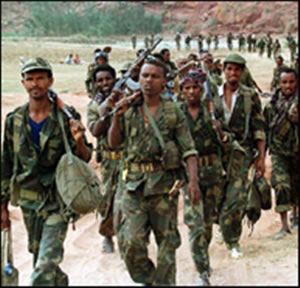Ethiopia begins Somalia withdrawal
 Mogadishu - Dozens of trucks full of Ethiopian soldiers and their belongings left the Somali capital Mogadishu Friday as Ethiopia began to withdraw from its neighbour after a two-year occupation.
Mogadishu - Dozens of trucks full of Ethiopian soldiers and their belongings left the Somali capital Mogadishu Friday as Ethiopia began to withdraw from its neighbour after a two-year occupation.
Ethiopian forces invaded in late 2006 to help kick out the Islamic Courts Union (ICU) - a hardline Islamist regime that was in power for six months.
They have spent the last two years battling a resultant insurgency in Southern and Central Somalia.
Ethiopia in late November announced it would pull out as the Somali government falls apart amid political infighting, prompting fears of a power vacuum.
"I saw twenty or more Ethiopian vehicles full of soldiers and equipment passing the road to Afgoye," Zamzam Saed Muktar, a resident in Afgoye, 30 kilometres from Mogadishu, told Deutsche Presse-Agentur dpa. "They were heavily loaded with their belongings."
Bereket Simon, special advisor to the Ethiopian prime minister, confirmed the withdrawal was underway and that it would be finalised as soon as possible.
The beginning of the pullout was marred by a roadside bomb that claimed the lives of two Ethiopian soldiers and many civilians, reports said.
Somalia has been embroiled in chaos ever since the 1991 ouster of dictator Mohamed Siad Barre.
The crisis deepened after the Ethiopian invasion sparked a bloody insurgency that has killed over 10,000 civilian and displace around one million.
Insurgent group al-Shabaab is now perched on the edge of Mogadishu.
Only ramshackle government forces and an undermanned African Union force of around 3,000 troops will stand between al-Shabaab and control of Somalia once Ethiopia leaves.
Al-Shabaab has been implementing strict Islamic law as it takes over towns, and many are concerned of a radicalization of the population should it gain complete control.
The US says that al-Shabaab has close links to al-Qaeda. However, little hard evidence has emerged to prove this.
The AU is desperately trying to scrape up more troops to send in. United Nations Secretary General Ban Ki-moon has rejected calls to send in a peacekeeping mission, saying there is "no peace to keep."
However, the insurgents are far from united and analysts have been warning that Ethiopia's departure could lead to a splintering of the groups and further conflict for the long suffering Somali people.
This seems to be taking place already, with a relatively new Islamist group, Ahlu Sunna Waljamaca, clashing with al-Shabaab in the last week.
There is, nonetheless, some optimism that the resignation of President Abdullahi Yusuf Ahmed on Monday and the departure of the Ethiopians could give fresh impetus to an ongoing UN-backed peace process and help create a government of national unity. (dpa)